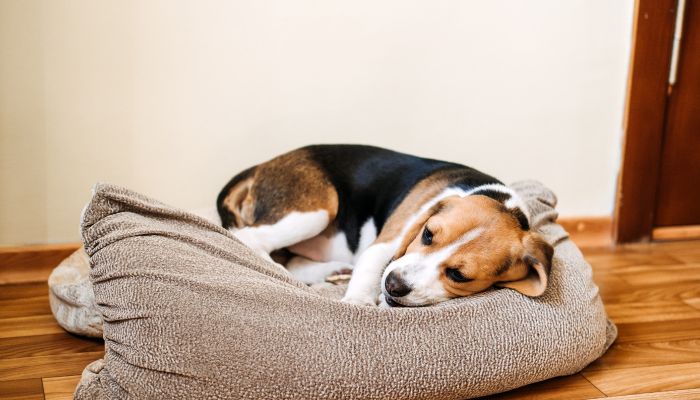
It is not recommended to force feed a dog with parvo. Parvo is a serious and highly contagious disease that affects dogs, particularly puppies. It is caused by a virus that attacks the gastrointestinal tract and can lead to severe dehydration and malnutrition.
If your dog has been diagnosed with parvo, it is important to seek immediate veterinary care. The treatment for parvo typically includes supportive care such as fluids to help prevent dehydration and electrolyte imbalances, and medications to help control vomiting and diarrhea.
Forcing food or fluids into a dog with parvo could potentially make their condition worse, as the virus can cause inflammation and damage to the gastrointestinal tract. It is important to follow the treatment plan recommended by your veterinarian, which may include giving your dog small amounts of a special diet or electrolyte solution to help them recover.
If you are concerned about your dog’s health, it is important to consult with a veterinarian as soon as possible. They will be able to advise you on the best course of action for your dog’s specific situation.
Should You Force Feed A Dog With Parvo
It is not recommended to force feed a dog with parvo. If your dog has been diagnosed with parvo, it is important to seek immediate veterinary care.
The treatment for parvo typically includes supportive care such as fluids to help prevent dehydration and electrolyte imbalances, and medications to help control vomiting and diarrhea.
Forcing food or fluids into a dog with parvo could potentially make their condition worse, as the virus can cause inflammation and damage to the gastrointestinal tract.
It is important to follow the treatment plan recommended by your veterinarian, which may include giving your dog small amounts of a special diet or electrolyte solution to help them recover.
How Long Can My Dog Go Without Eating With Parvo?
It is important for dogs with parvo to receive treatment as soon as possible. Parvo is a serious and highly contagious disease that affects dogs, particularly puppies. It is caused by a virus that attacks the gastrointestinal tract and can lead to severe dehydration and malnutrition.
The length of time a dog can go without eating with parvo will depend on various factors, including the severity of the infection, the overall health of the dog, and their age.
In general, dogs that are not eating or are not able to keep food down may become weak and dehydrated quickly. It is important to seek veterinary care as soon as possible if your dog is not eating due to parvo or any other illness.
Your veterinarian will be able to recommend the best course of treatment for your dog based on their specific situation. This may include providing fluids and electrolytes to help prevent dehydration, as well as medications to help control vomiting and diarrhea.
In some cases, it may be necessary to provide nutrition through a feeding tube or intravenous fluids. It is important to follow your veterinarian’s recommendations and provide the necessary care to help your dog recover from parvo.
How Do I Know If My Dog With Parvo Is Getting Worse?
There are several signs that a dog with parvo may be getting worse:
Persistent vomiting and diarrhea: If your dog is unable to keep food or fluids down and continues to vomit or have diarrhea, they may be at risk of dehydration.
Weakness and lethargy: If your dog is experiencing weakness and lethargy, they may not have the energy to fight off the infection.
Loss of appetite: A loss of appetite can be a sign that your dog is not feeling well and may be getting worse.
Abdominal pain: Parvo can cause inflammation and damage to the gastrointestinal tract, which can lead to abdominal pain.
Fever: A fever may be a sign of a worsening infection.
If you notice any of these signs in your dog with parvo, it is important to contact your veterinarian as soon as possible. They will be able to advise you on the best course of action and provide the necessary treatment to help your dog recover.
It is important to note that parvo is a serious and highly contagious disease that requires immediate veterinary care. If your dog has been diagnosed with parvo, it is important to follow your veterinarian’s treatment plan and provide the necessary care to help your dog recover.
How Do You Hydrate a Dog With Parvo?
It’s worth noting that it is important to follow your veterinarian’s treatment plan for your dog with parvo.
In addition to providing fluids and electrolytes, your veterinarian may recommend medications to help control vomiting and diarrhea and a special diet to help your dog recover.
It is important to follow their recommendations and provide the necessary care to help your dog recover from parvo.
How Do I Feed My Dog With Parvo?
If your dog has been diagnosed with parvo, it is important to follow your veterinarian’s treatment plan. The treatment for parvo typically includes supportive care such as fluids to help prevent dehydration and electrolyte imbalances, and medications to help control vomiting and diarrhea.
In some cases, it may be necessary to provide nutrition through a feeding tube or intravenous fluids if your dog is unable to eat on their own. Your veterinarian will be able to advise you on the best course of action based on your dog’s specific situation.
If your dog is able to eat, your veterinarian may recommend a special diet to help them recover from parvo. This may include a highly digestible, low-fat diet to help reduce the burden on the gastrointestinal tract and promote healing. Your veterinarian may also recommend feeding your dog small, frequent meals rather than one large meal.
It is important to follow your veterinarian’s recommendations and provide the necessary care to help your dog recover from parvo. If you are concerned about your dog’s health or have any questions, it is important to consult with a veterinarian. They will be able to advise you on the best course of action for your dog’s specific situation.

